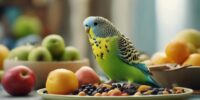What Are the Signs of a Healthy Cockatiel?
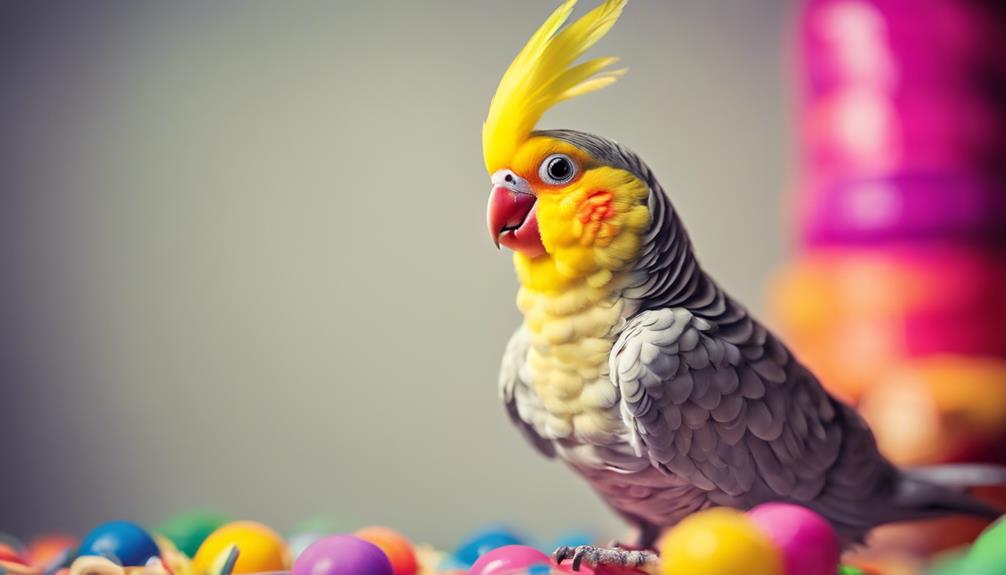
Signs of a healthy cockatiel include:
- Bright eyes
- Shiny feathers
- A good appetite
- High energy levels
- Stable weight
Additional subtle signs can also indicate the overall well-being of your bird.
Key Takeaways
- Bright, clear eyes and sleek, glossy feathers indicate good health.
- Active behavior, diverse diet, and consistent eating patterns are signs of a healthy cockatiel.
- Smooth, vibrant plumage, well-groomed feathers, and clear eyes show physical well-being.
- High energy levels, engagement in play, and curiosity reflect mental and emotional wellness.
Physical Appearance
Bright, clear eyes in a cockatiel are a key indicator of alertness and vitality, showcasing their overall health. When observing a healthy bird, one would notice vibrant eyes that are free from any cloudiness or discharge. Additionally, their feathers play a crucial role in assessing their well-being. A healthy cockatiel will have unbroken, shiny plumage that's well-groomed, reflecting good physical health. The feathers shouldn't appear dull or ruffled but instead should exude a sleek and glossy appearance.
Apart from their eyes and feathers, a healthy cockatiel will exhibit a strong and robust physical appearance. This includes being active and energetic, with no signs of lethargy. A healthy bird won't be fluffed up or sitting at the bottom of the cage but will instead be moving around, chirping, and engaging with its environment. These physical cues indicate a bird that's thriving and in good health.
Eating Habits
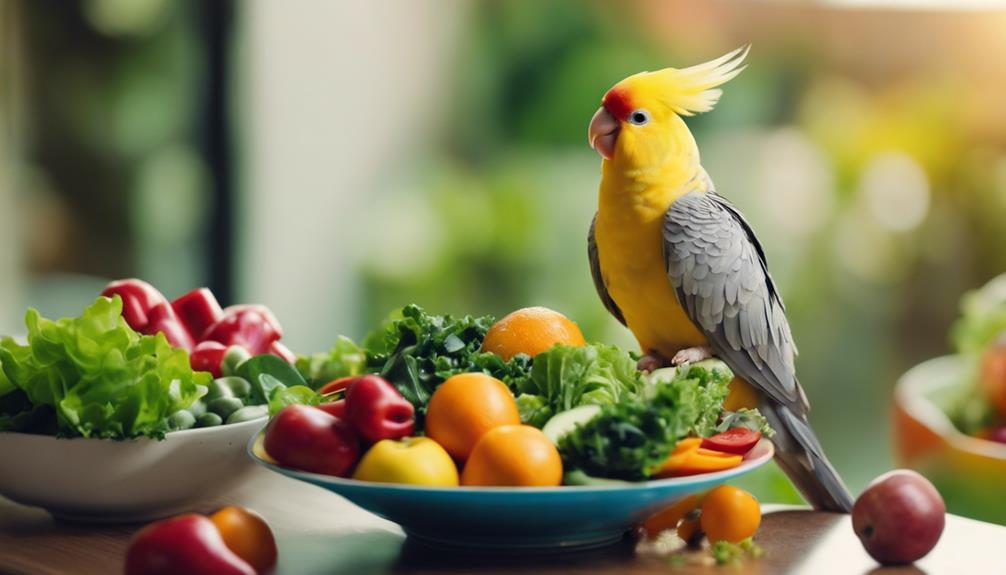
When it comes to assessing the health of a cockatiel, a crucial aspect to consider is their eating habits. A healthy cockatiel will have a good appetite and show interest in eating a variety of foods. Observing regular and consistent eating habits is a sign of a healthy cockatiel. They should eagerly consume their meals without signs of disinterest or reluctance. Monitoring a cockatiel's eating habits can provide valuable insight into their overall health status. Changes in eating patterns, such as a sudden decrease in appetite, may indicate potential health issues in a cockatiel.
| Eating Habits | Description |
|---|---|
| Good appetite | Shows interest in various foods and consumes meals eagerly. |
| Regularity | Maintains consistent eating patterns, indicating a healthy cockatiel. |
| Variety of foods | Enjoys a diverse diet, showcasing a good appetite and nutritional balance. |
| Changes in appetite | Sudden decrease may signify underlying health problems. |
| Monitoring | Observing eating habits provides insights into the bird's overall health. |
Activity Level

A healthy cockatiel's activity level is a strong indicator of its overall well-being.
Active birds will display playful behavior, engaging in exploration and interaction with their surroundings.
Regular exercise is essential to maintaining their vitality and ensuring they exhibit a lively response to stimuli.
Playful Behavior
In healthy cockatiels, their playful behavior is characterized by engaging in active and energetic movements, displaying curiosity in exploring toys, and interacting with their environment. This behavior is a positive sign of their well-being and happiness.
When observing your cockatiel's playful behavior, look for the following signs:
- Active Movements: Healthy cockatiels will exhibit lively actions such as flapping wings, climbing, and hopping around.
- Curiosity: They'll show interest in their surroundings by exploring toys and investigating their environment.
- Social Interactions: Playful cockatiels will engage in chirping, singing, and communicating with their owners or other birds.
- Mental Stimulation: Their playful antics indicate mental stimulation, physical health, and overall good spirits.
Understanding and encouraging your cockatiel's playful behavior is essential for their mental and physical well-being.
Regular Exercise
Healthy cockatiels maintain their physical and mental well-being through engaging in regular exercise, encompassing activities like flying, climbing, and playing. Regular activity is crucial for cockatiels as it helps them maintain muscle tone, cardiovascular health, and overall wellness.
Cockatiels are naturally curious and active birds, so a lack of interest in activities, reduced movement, or lethargy could signal underlying health issues. Monitoring their exercise levels can provide valuable insights into their health status, allowing for early detection of any problems that may arise.
Encouraging regular exercise by providing stimulating toys, perches, and interaction opportunities can help ensure that your cockatiel remains happy and healthy. Remember, a vibrant activity level is a key indicator of a thriving cockatiel.
Vocalizations
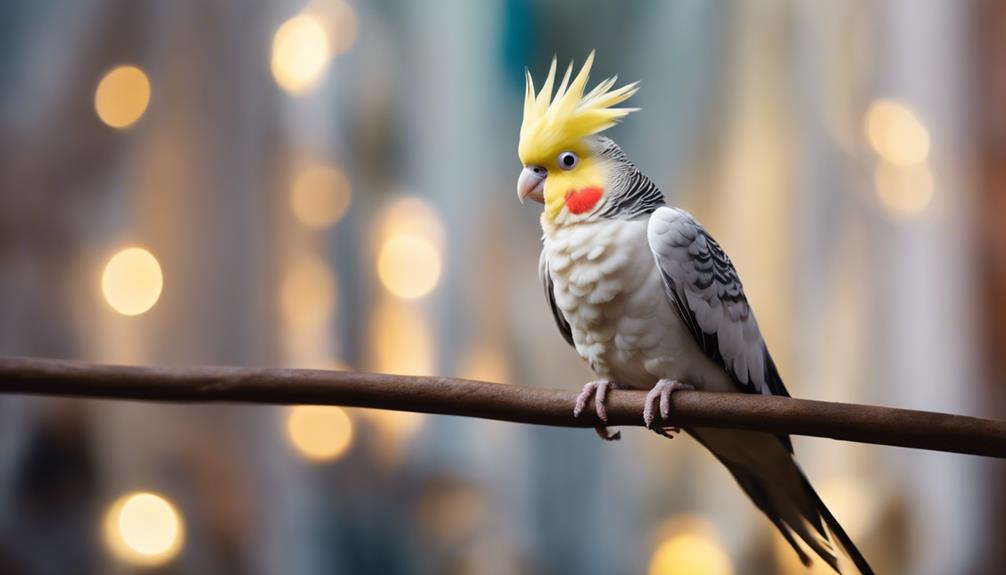
Healthy cockatiels express their mood and well-being through clear, melodic whistles and chirps. Varied vocalizations indicate a robust health status, while consistent singing reflects overall wellness.
Clear whistles suggest vitality and engagement in social interactions, providing insight into the emotional and physical condition of the bird.
Varied Vocalizations Indicate Health
Regularly monitoring the varied vocalizations of a cockatiel is crucial for assessing its emotional well-being and overall communication skills.
Varied Vocalizations Indicate Health:
- Chirps, Whistles, and Melodic Tunes: Healthy cockatiels exhibit a range of vocal expressions.
- Emotional Well-Being: The diversity in vocalizations signals engagement, happiness, and social interaction.
- Communication Skills: Consistent and diverse vocal patterns show the bird's mental wellness.
- Health Assessment: Changes in vocalization patterns may indicate stress, boredom, or underlying health issues.
Consistent Singing Shows Wellness
Monitoring a cockatiel's consistent singing behavior is a key indicator of its overall wellness and emotional state. A healthy cockatiel will engage in regular vocalizations, showing contentment and social interaction. These signs of vitality demonstrate that the bird is happy and in good health. Cockatiels use their vocalizations to communicate with their owners and other birds, forming strong bonds through these interactions. Any changes in the singing patterns should be closely monitored, as they can be an early sign of underlying health issues. By paying attention to the consistency and frequency of your cockatiel's singing, you can ensure that your feathered friend is thriving both physically and emotionally.
| Signs of a Healthy Cockatiel | |
|---|---|
| Regular singing | Contentment |
| Active vocalization | Social interaction |
| Consistent behavior | Well-being |
Clear Whistles Suggest Vitality
Vitality and good health in a cockatiel are often reflected in the clarity and melodiousness of its whistles. When assessing a cockatiel's well-being through its vocalizations, here are key points to consider:
- Clear, melodious whistles indicate vitality and good health.
- Consistent and varied vocalizations show the bird's engagement and well-being.
- Healthy cockatiels express happiness and contentment through active and musical whistling.
- Changes in the bird's whistling patterns can signal underlying health issues or stress.
Monitoring the quality and frequency of a cockatiel's whistles can provide valuable insights into its overall health. If the bird shows signs of a sick cockatiel, such as changes in its whistling behavior or a tendency to fluff up their feathers, consulting with a professional, like the Association of Avian Veterinarians, is recommended.
Feather Condition

A healthy cockatiel's feather condition is a reliable indicator of its overall well-being. This is showcased by smooth, vibrant plumage that's free from damage or irregularities. Healthy birds are likely to have well-groomed feathers that are vibrant in color and evenly spread across their bodies.
Feather health is a good indicator that the bird is feeling well. It's important to observe for any bald patches, signs of plucking behavior, or excessive preening, as these can indicate issues with feather health. Regular and smooth molting is another sign of a healthy bird, as it should occur without causing the bird stress or discomfort.
The quality of a cockatiel's feathers reflects its overall health, with shiny, clean, and intact feathers being key indicators of a healthy bird. By paying attention to the condition of a cockatiel's feathers, one can gain valuable insights into the bird's well-being and overall health.
Eye and Nose Health
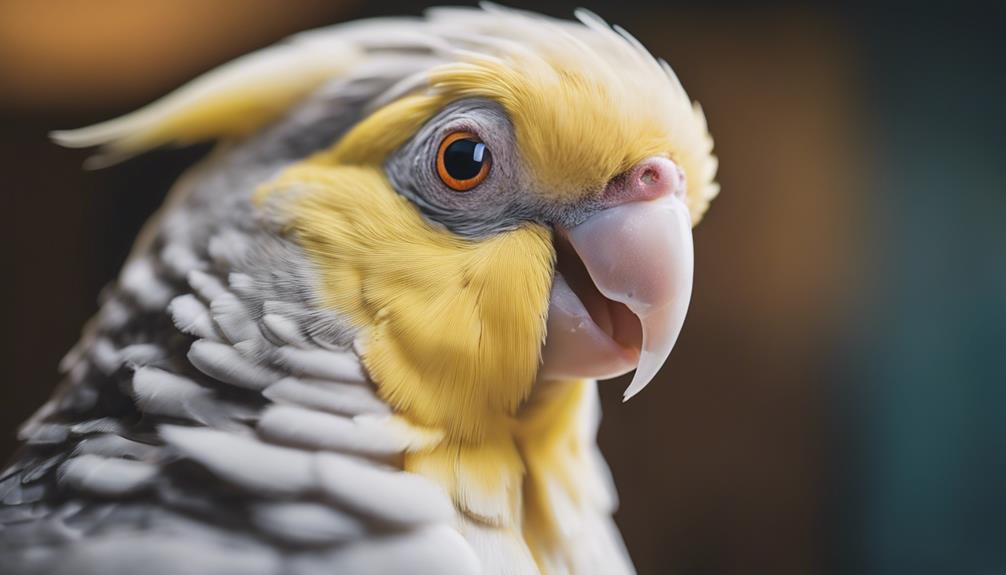
The condition of a cockatiel's eyes and nostrils is crucial in determining its overall health and well-being. When examining these areas, here are important signs to look out for:
- Bright Eyes: Healthy cockatiels have bright, clear eyes without any signs of discharge or cloudiness.
- Dry Nostrils: The nostrils of a healthy cockatiel should be dry, clear, and free from any crustiness or discoloration.
- No Redness or Swelling: In a healthy bird, the eyes and nose shouldn't show any redness, swelling, or abnormal secretions.
- Regular Monitoring: Regularly monitoring the eyes and nostrils for changes can help in detecting early signs of health issues in cockatiels.
Changes such as redness, swelling, discharge, or crustiness can indicate underlying problems. Sick birds may exhibit signs of lethargy, abnormal birds droppings, and reduced activity. Therefore, it's essential to pay close attention to the eyes and nose of your cockatiel to ensure its well-being and catch any potential health issues early.
Energy and Playfulness
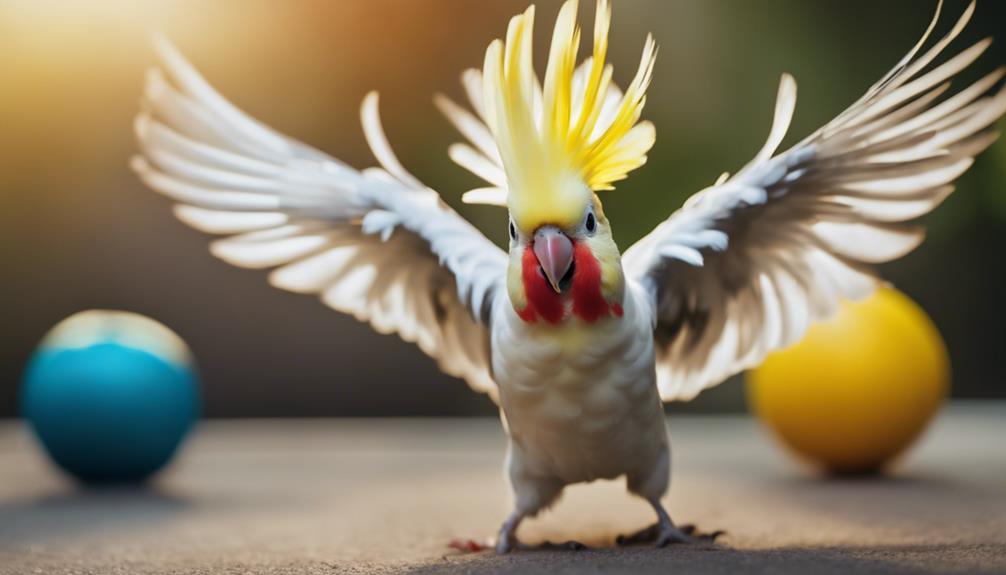
Cockatiels demonstrate their well-being and mental stimulation through their high energy levels and playful behaviors such as climbing, flying, and exploring their surroundings. Active engagement in play activities is crucial for their overall well-being. Healthy cockatiels exhibit curiosity and interest in toys, perches, and interacting with their human companions. By observing a cockatiel's enthusiasm for play, one can gauge their physical fitness and mental health. Playfulness is a key indicator of a cockatiel's happiness, with their inquisitive nature shining through during playtime.
Providing a variety of toys, swings, and opportunities for exploration can keep your cockatiel mentally stimulated and physically active. Interacting with your bird through games and training sessions can further enhance their play experiences. Ensuring a stimulating environment with safe toys and spaces for climbing and flying will contribute to a happy and healthy cockatiel. Remember, a lively and playful cockatiel is often a sign of a content and well-cared-for bird.
Frequently Asked Questions
What Does a Healthy Cockatiel Look Like?
A healthy cockatiel looks like a vibrant, feathered ball of energy. Its feathers are glossy, its eyes gleam with vitality, and it engages playfully with its surroundings. A hearty appetite, lively behavior, and pristine feathers are telltale signs of a thriving bird.
What Are the Signs of a Sick Cockatiel?
Signs of a sick cockatiel include changes in feather condition, appetite, and behavior. Fluffed feathers, loss of appetite, and unusual behavior like lethargy or decreased chirping are indicators of potential illness in these birds.
Is My Cockatiel Healthy?
Curious and lively, the cockatiel perches contentedly in its cage, chirping and fluffing its feathers. With bright eyes, a shiny coat, and a vibrant cere, it's undoubtedly a picture of health.
How Can You Tell if a Cockatiel Is Happy?
When trying to determine a cockatiel's happiness, behavior analysis, vocalizations, physical appearance, body language, environmental enrichment, and diet requirements are key. Observing their playful interactions, relaxed demeanor, and positive engagement with their surroundings can provide valuable insights.




